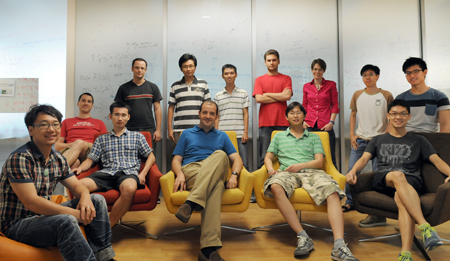Highlights
Randomness and other research: group update from Valerio Scarani
You are the lead Principal Investigator for a $10 million project on randomness that recently started. Do you have any results so far?
At the fundamental level, we are excited that quantum physics tells us there is real randomness in nature. At a practical level, we have to be able to say what we can do with a quantum source of randomness that we cannot do with a normal source. We already have a result on this that I like. Last year, the groups of Renato Renner at ETH Zurich, Switzerland; Antonio Acin at ICFO in Barcelona, Spain and Marcin Pawlowski at the National Quantum Information Centre in Gdansk, Poland published papers that show how a quantum step (a Bell test) can amplify the quality of a source of randomness. We have clarified the power of an assumption they all made, and shown what one can do if that assumption is not made. The assumption wasn't hidden, but we've found that many people had not noticed it. In today's fast-speed science, it happens often that we register the claims made by our colleagues but do not read the papers carefully.
For the randomness project overall, which has been funded by Singapore's Ministry of Education and involves other CQT PIs too, we have many goals.

Are all your group members working on randomness?
No. Essentially half are. My group is converging to a double structure. Right now I have four postdocs and seven PhD students, and in one year I should have two postdocs and five students. People are moving on as they graduate and reach the end of their postdocs. I'm very happy with everyone I've hired, but I think this will make my group a more manageable size. There will be one postdoc for each research direction: Jean-Daniel Bancal will be looking after the randomness and Le Huy Nguyen the other projects. These other directions are still evolving.
In the past, we've done a lot with quantum optics and cavities, and we're exploring how to continue to interact with the experimental efforts. We've also started studying what it means for a quantum state of many parties to be complex. This is relevant for quantum computing – clearly for a quantum computer to be useful, you need a complex state because if the state is simple you can just simulate it on your ordinary computer. A few years ago, Scott Aaronson from the Massachusetts Institute of Technology in Cambridge, United States, proposed an interesting new measure of complexity, and we are making some progress in how to compute it. I've had positive feedback so far, and we've had the result accepted for presentation at conferences in Japan, the Czech Republic, Crete and Italy this year.
Your group has just graduated its first PhD student – Yimin Wang. That must be reason for celebration.
I think Yimin was the only person in the world who doubted the outcome of the exam. When she came out and said that she'd passed, I said congratulations and what else would you expect? Something that makes me very happy is to know that she has received postdoc offers from around the world. Circumstances may not allow her to accept them, but when professors, unrequested, ask hey, what is she doing next, that shows her work is meaningful. She did a very decent job on a topic in which I am not an expert, coming up with proposals for a technology for quantum computing known as circuit QED. My role in her thesis was very often to team her up with a good postdoc, Jiri Minar, and with good people, rather than to give her advice myself. She made a few trips to Spain to work with people there.
You students travel often and a few have spent some months in other universities. What is your reason for encouraging this?
For everyone starting in professional life, it helps to have perspective. PhD students may oscillate between two extremes. When a proof is finished or a paper accepted, the student is full of enthusiasm and their project may look to them like the most important goal of science. When small setbacks come, they may feel all the effort is worthless and their project is just their supervisor's petty concern. By collaborating with good people in other places, they see that their project is neither more nor less interesting than many other projects pursued all over the world.






